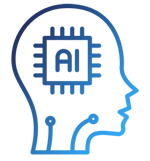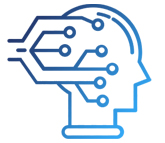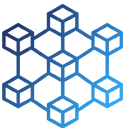- AI

Artificial Intelligence

Smart Products & Services
We follow Smart Products & Services

Intelligent Business Functions & Processes
We follow Intelligent Business Functions & Processes

Robotic Process Automation
We follow Robotic Process Automation

Personalized
healthcareWe follow Personalized healthcare

Identifying at-risk patients
We follow Identifying at-risk patients

Optimized routing and scheduling
We follow Optimized routing and scheduling
- ML

Machine Learning

Predictive
AnalyticsWe follow Predictive Analytics

Service Personalization
We follow Service Personalization

NLP
We follow NLP (Natural Language Processing)

Stock Market Forecasting
We follow Stock Market Forecasting

Fraud Prevention
We follow Fraud Prevention

Recommender engines
We follow Recommender engines
- blockchain
- IOT

Internet of Things
- AR
- Business Solutions

Business Solution

Business Performance Management
We follow Business Performance Management

Decision Making & Big Data Analytics
We follow Decision Making & Big Data Analytics

Enterprise Data Management
We follow Enterprise Data Management
- Apps

Apps

Native Apps
We follow Native Apps

Cross Platform Apps
We follow Cross Platform Apps

Web Apps
We follow Web Apps

Hybrid Apps
We follow Hybrid Apps

Cloud Native Apps
We follow Cloud Native Apps
- Lab

32 Main DevOps Tools Tech Professionals Required In 2024
The prosperous implementation of DevOps, or software development (dev) and operations (ops), lies in a cultural shift or the strategic incorporation of significant tools. Cooperation among software development and operations teams stands out as a crucial factor for innovation. Automation streamlines making, testing, event management, and release processes, accelerating time-to-market and refining product quality.
However, the evolution of DevOps stretches beyond mere cultural and automation facets. It now covers forward-looking technologies like AI/ML/IoT/cloud computing. A myriad of DevOps tools have begun. They serve varied needs like make management, event resolution, configuration management, edition control, and project tracking. These advancements signify a holistic technique to software development and operations, ushering in a time of productivity and resilience.
In this blog, we will discuss the 32 big DevOps tools of 2024 that every tech firm must use.
Call Sky Potential, our software development company in the UK. If you need software built, let us know. We are experts in the best DevOps tools and guarantee the best outcome. Have a free session with us.
Core components of DevOps

With its essence principles and methods, DevOps is the backbone for organisations aiming to streamline software development and IT operations. Its steering forces are cooperation, automation, and a culture of continuous enhancement.
- Automation, a crucial aspect, slashes manual tasks, growing effectiveness. It encompasses automated make processes, continuous integration/continuous distribution (ci/cd) pipelines, and infrastructure provisioning.
- DevOps allows a cultural shift encouragement of a shared responsibility and trust, and also encourages team work and communiqué in the middle of development, operations, and other teams.
- Continuous incorporation (CI) automates code incorporation multiple times daily into a shared repository, accompanied by automated tests to nip hindrances in the bud.
- Continuous distribution (CD) is made upon CI, automating code deployment and distribution to creation or staging environments, assuring a perpetually deployable software state.
- Monitoring and feedback, or constantly surveilling applications and infrastructure, is crucial for issue identification and feedback gathering. Tools like Prometheus and Grafana facilitate this process.
- Knowledge sharing and documentation, emphasising cross-training and documentation, guarantee knowledgeable and effective teamwork.
- Microservices and containerisation, frequently keep by DevOps, break applications into modular components, refining scalability and manageability.
- Infrastructure as code (IAC) allows for the automated provisioning and management of infrastructure assets through code, guaranteeing consistency with tools like Terraform and Ansible.
- Feedback loops are of the utmost importance for enhancement, collecting insights from end-users, operations, and development, steering data-driven decisions, and procedure refinements.
- Edition control systems like Git track code changes, allowing cooperation, code review, and rollback abilities.
- Security (DevSecOps) is integrated throughout the pipeline, and at each stage, vulnerability scanning and automated security testing are imposed.
- Scalability and resilience, integral to DevOps, entail strategising for scalability and constructing resilient systems that can withstand unexpected failures and increased workloads.
- DevOps balances with agile methodologies, advocating for iterative and incremental development to rapidly adapt to evolving requirements.
Streamline your software development with our DevOps experts. We are a projecting software development company with highly trained developers and proven CI/CD and automation solutions.
Top DevOps tools

Git (gitlab, github, bitbucket)
Git is indispensable. As a keystone of software creation and DevOps, it eases collaborative coding, edition control, and effective project management. Its importance has surged as technology progresses, necessitating organised code management.
Developers smoothly work in partnership on codebases, make and unite branches for bug fixes and new features. Git’s distributed nature allows offline work, which is crucial in remote environments today.
Git carefully tracks code modifications. It allows teams to identify changes’ timing and rationale, which is of the utmost importance for code quality and security. It remains steadfast in effective, cooperative, and protected coding methods as software development drives innovation.
Call our software development company for your enterprise software creation project. Have a call.
Maven

Maven maintains its crucial role, streamlining Java-based project development by managing reliance, facilitating creating processes, and overseeing project lifecycles. Its automation prowess simplifies compilation, testing, packaging, and distribution.
Maven’s importance in managing reliance and supporting continuous incorporation and deployment remains paramount. It confirms software reliability, maintainability, and scalability, combining seamlessly with modern DevOps methodologies.
Jenkins
At the core of software development lies Jenkins, an automation server steering continuous integration and distribution pipelines. With it, everything is automated, from making and testing to deploying code for any ups and downs. Now, you have swift and reliable software distribution.
As applications grow complex, effective CI/CD processes become crucial. Jenkins gives flexibility and a large-scale plugin library. It is adjustable to varied development environments. It focuses on rapidity, steadfastness, and collaboration.
Chef
Chef is a potent automation platform for infrastructure management. The best option for scalability, reliability, and efficiency. The chef improves operational usefulness and consistency. It automates server provisioning, configuration, and maintenance.
It, without issue, integrates with numerous technologies and tools. It is adaptable to the evolving tech. As organisations prioritise agility and scalability, chefs persist in being of the utmost importance for promoting innovation and distribution and automating complex infrastructure tasks.
Puppet

Puppet simplifies IT infrastructures orchestration and management by describing infrastructure as code. It confirms consistency across servers, cloud instances, and containers, decreasing errors and accelerating software distribution.
Puppet simplifies provisioning, configuration, and continuous compliance, decreasing operational complexity and upholding high security and compliance standards necessary for DevOps teams.
Ansible

Ansible is an adaptable automation and configuration management tool that simplifies repetitive tasks and refines operational effectiveness and agility. With its declarative language and large-scale module library, ansible caters to varied environments, facilitating simplified operations and scalable infrastructure management.
Docker
Docker simplifies application management in modern software development and DevOps by encapsulating applications and relying on containers. It confirms regular and reproducible deployments throughout the development lifecycle, refining portability and scalability.
Docker’s containerisation addresses challenges in development and creation environment discrepancies, which is central for effective application deployment in DevOps and continuous distribution pipelines.
Kubernetes
Kubernetes, also called as K8S, is must in up-to-date software creation and operations. It orchestrates, manages, and automates containerised applications at scale. This tool has self-healing and resilience skills. It also has multi-cloud and hybrid environment support. These help achieve reliability, cost-effectiveness, and agility in application deployment.
Kubernetes speeds up software distribution, improves resource usage, and efficaciously meets the evolving desires of the digital.
Slack

Slack is a crucial tool for companies worldwide. It promotes smooth communication and cooperation among teams, regardless of location. Its real-time messaging, file sharing, and incorporation abilities streamline workflow, uplift productivity, and guarantee teams remain joined across different time zones.
As more firms adopt hybrid and remote work models, Slack becomes a critical hub for refining agility, knowledge sharing, project coordination, quick decision-making, efficiency, and keenness.
AWS cloud computing and storage in DevOps
This tool crucial in DevOps methods by supplying scalable, adjustable, and gainful infrastructure. AWS services balance flawlessly with modern software development desires, allowing quick deployment, continuous incorporation, and automation. AWS’s storage solutions guarantee the effective data management and resilience necessary for DevOps operations, allowing teams to emphasise innovation and effectiveness.
Azure cloud computing and storage in DevOps
An equally important tool in DevOps methods. This tool provide a large-scale cloud ecosystem for deploying applications, scaling infrastructure, and storing data safely. Azure’s incorporation with DevOps tools simplifies the software development lifecycle by enhancing cooperation and automation. Its storage solutions help the data-driven aspects of DevOps. Protected storage and retrieval of crucial data were built, improving software development and distribution processes.
GCP cloud computing and storage in DevOps
The Google Cloud Platform (GCP) offers powerful cloud computing and storage solutions for modern DevOps methods. GCP’s large-scale services allow DevOps teams to build, deploy, and oversee applications with ease. Its automation, infrastructure-as-code, and container orchestration abilities align seamlessly with DevOps principles. At the same time, advanced technologies like AI and machine learning provide monitoring, analytics, and automation tools, improving software operations efficiently.
As proficient in cloud computing and DevOps, our software development company can be an ideal destination for your enterprise software project. Give us a call.
Monitoring, alerting, and event response tools: SignalFx
Monitoring, alerting, and event response tools such as SignalFx are essential in DevOps and software creation. Signalfx’s smart monitoring tools help companies find problems before they become significant. They can spot strange things happening, figure out what’s causing them, and send smart notifications to keep things running smoothly. This confirms high availability, optimal resource usage, and a smooth consumer experience, dealing with performance hindrances before end-users influence effectively.
Appdynamics
Appdynamics, a prominent application performance management and monitoring platform, confirms optimal performance for modern digital companies. It gives real-time visibility into application performance, allowing companies to recognise and address hindrances rapidly.
With the expanding complexity of applications, appdynamics allows companies to bring extraordinary consumer experiences, maintain application reliability, and rapidly answer to performance hindrances, guaranteeing continued achievement and competitiveness.
Splunk Cloud
Splunk Cloud helps organisations acquire crucial insights from immense data volumes. As companies depend more on data-driven decisions, Splunk Cloud sticks out for real-time monitoring, analysing, and visualising machine-generated data. Its advanced security analytics are vital in keeping against cyber threats. Now a high data integrity with improved operational superiority is fully assured.
Selenium
Selenium is crucial in software testing and automation. It guarantees web application excellence across various browsers and platforms. Its powerful automation abilities allow effective testing task automation and cross-browser testing, aligning with modern software development practices’ continuous distribution goals.
Gremlin
Gremlin is a major in chaos engineering, which confirms the reliability and resilience of modern software systems. Firms proactively recognise infrastructure and application weaknesses by simulating controlled failures and building more powerful, fault-tolerant systems.
Scripting
Scripting continues to be vital. It can automate and streamline numerous software development, system administration, and DevOps tasks. Python, bash, and PowerShell let professionals build code that excellently executes repetitive tasks, manipulates data, and orchestrates complex processes. Thus, you can refine productivity and decrease errors.
Raygun
Raygun is a crucial tool in software development and DevOps that confirms application reliability and performance. With this, teams can recognise, diagnose, and resolve real-time hindrances. Its value lies in giving actionable insights into performance bottlenecks and application errors amidst greater software complexity. Raygun gives software an excellent quality by proactively dealing with interruptions, reducing stoppage, and refining consumer fulfillment.
ServiceNow

ServiceNow gives a unified, cloud-based solution for automating numerous company processes and simplifying service management. Its intelligent automation abilities improve productivity, agility, and client satisfaction while decreasing operational costs, steering digital change in 2024.
Status service updates: the status page
This tool is crucial for organisations, delivering real-time data about service operational status and promoting openness, trust, and client satisfaction. Its prompt communication of service disruptions and event resolutions showcases firms dedication to responsiveness, strengthening client relationships and trust.
Elk (Elasticsearch, Logstash, and Kibana)
In DevOps and its operations, the elk stack continues to glow. Comprising Elasticsearch, logstash, and Kibana, this potent trio is a cornerstone for effective log management, monitoring, and data visualisation. Elasticsearch, renowned for its scalability and real-time indexing abilities, caters as a lightning-fast search engine.
Logstash adeptly collects, processes, and transforms log data from varied sources and seamlessly integrates with elasticsearch. Meanwhile, Kibana offers an intuitive interface, allowing users to customise dashboards and powerful data exploration tools. In 2024, elk remains crucial in furnishing organisations with holistic insights into their systems, applications, and infrastructure.
GitLab CI/CD

GitLab CI/CD automates the end-to-end software distribution pipeline within a unified environment. It eases continuous incorporation (CI) by automatically constructing and testing code changes; GitLab CI/CD confirms early issue detection. Its continuous deployment (CD) functionality automates the release procedure. The tool minimizes errors. The tool allows quick feature distribution in response to changing marketplace needs.
Terraform
Terraform assumes a crucial role in modern infrastructure provisioning and management by allowing the automated formation and configuration of cloud assets and containers. As cloud computing, microservices, and containerisation become ubiquitous, Terraform confirms agility and scalability, facilitating effective infrastructure operations and application deployment.
Phantom
Phantom is a game-changer in security automation and event response. Automating security workflows, from threat detection to response orchestration, decreases response times and improves consistency, allowing security teams to defend against evolving cyber threats effectively.
Nagios
Nagios, an alerting and open-source monitoring system, retains its value in preserving the application’s reliability and infrastructure. With real-time monitoring and alerting abilities, Nagios allows teams to detect and address hindrances promptly, promising the availability, stability, and security of crucial systems in present-day complexes.
Vagrant
Vagrant is a requisite tool in software development and DevOps. It simplifies the formation and management of reproducible development environments— a must for easy software creation, testing, and deployment. Vagrant assumes regular and isolated environments are paramount for smooth software build-up, testing, and deployment.
With the increasing complexity of software stacks, reliance, and infrastructure configurations, the vagrant’s importance remains. It makes it easy to share, scale, and maintain different environments on many different operating systems. This means fewer problems and headaches when working on projects.
Sentry
Sentry is a crucial component in modern software development and DevOps. It offers real-time mistake tracking and monitoring. Proactive detection and diagnosis of hindrances is possible with this. You can minimise downtime and refine the user experience (UX). As software applications become more intricate, the “Sentry” role in maintaining overall system wellness and dependability becomes increasingly crucial.
Prometheus
Prometheus has a big status in DevOps and observability— able to see what’s happening inside a system just by looking at its external behavior, such as logs, metrics, or traces. It collects, stores, and analyzes metrics from various parts of an application’s infrastructure. Its open-source nature and engaged community contribute to its acclaim. It gives major visibility for preserving application performance. Reliability in dynamic environments is now assured.
Gradle
Gradle is the most essential tool in software development and DevOps, delivering progressed automation abilities. Its adaptability and scalability serve numerous project dimensions and kinds, and managing multi-language, multi-project makes it effective. With companies adopting microservices architectures and cloud-native technologies, Gradle’s help for plugin-based customisation has become indispensable in managing the complexity of constructing, testing, and deploying applications across varied environments.
EG enterprise
EG company is a crucial solution for large-scale performance monitoring and diagnostics in today’s complex technology ecosystems. Its real-time monitoring, automated root cause analysis, and predictive analytics allow organisations to proactively recognise and address hindrances, enhance resource usage, and improve end-user experience.
Jira
Jira makes things easier and centralizes numerous aspects of the development lifecycle—an integrated platform for issue tracking, project strategising, and team collaboration. With customisable workflows, reporting, and integration abilities, Jira lets teams become accustomed to altering requirements. It eases agile methodologies and brings high-quality software successfully.
Conclusion
Taking on DevOps turns into imperious for firms struggling to bring software faster, with greater quality and reliability. The foundational DevOps tools outlined in this article are crucial for this transformative technique. From using GIT for edition control to executing continuous incorporation with Jenkins and from Docker for containerisation to Kubernetes for orchestration, these tools allow DevOps teams to automate, collaborate, and propel innovation.
You can connect with our software development company if you want to build software using these tools.
Among the hundreds of software and mobile app development companies in the UK, we lead the IT world with our knowledge of these tools.
Our mobile app development company is ready to get set up for any software development project.
Also called IoT, AI/ML, or blockchain app development company in the UK, get started with Sky Potential.



















































Leave a Reply